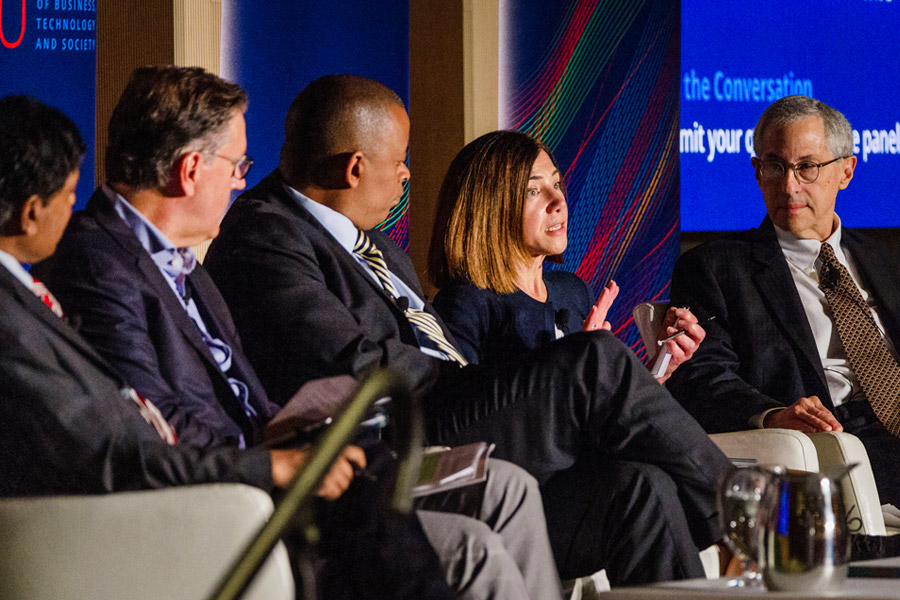News Roundup: New Boston University Online MBA, and More

Let’s take a look at some of the biggest stories from this week, including the new Boston University Online MBA at the Questrom School of Business.
Questrom to Offer Online MBA With edX in 2020 – BU Today
Boston University’s Questrom School of Business will partner with online education platform edX to establish an Online MBA, set to begin in 2020.
On news of the announcement, Boston University President Robert A. Brown says, “With the online MBA, we’re seizing the initiative to offer a major degree for which we believe there is global demand. Higher education must evolve in a fast-changing world. We aim to lead in this evolution.”
Applications officially open on August 16, 2019 and tuition will be $24,000 per year. edX was designed from researchers at Harvard University and MIT in 2012. Since its launch, it has gained more than 21 million users from every country across the world. Chrysanthos Dellarocas, Associate Provost for Digital Learning & Innovation, says, “Through this degree, BU opens itself to the world in a manner we haven’t done before.”
edX started offering Master’s programs last fall, including a master’s in analytics from the Georgia Institute of Technology and a master’s in computer science fro the University of Texas at Austin.
You can read here for more on the online MBA and on edX.
Should Investing be Left to Machines? – UC Davis Graduate School of Management News
Professor and economist Brad Barber of UC Davis Graduate School of Management recently weighed in on the question of the effect of human error in investments. Comprehending biases, he suggests, is the key to improving decisions.
Behavioral biases cost investors 4 percent per year, according to Barber. In a recent article in financial news publication Raconteur, Barber’s research was cited as was that of his colleagues. On the topic of bias and error in investing,
Barber’s colleague Craig Burgess says:
“We are pattern-seeking primates, which is useful for hunting prey, but terrible for complex tasks such as investing. So, we are now regularly prone to hundreds of biases, too deeply ingrained to overcome without removing the human from the process.”
‘Passive investments,’ or those completed via carefully designed software processes, are cheaper than investments performed by a fund manager, and absent of the inherent biases of humans. Many managers, however, argue that skilled ‘active investors’ can beat the effect of bias and error to greater effect than machine learning. For more on Barber’s research, read his profile. For the full Raconteur article, read here.
Save the Date for INTERSECT@CMU: Health Care Innovation – Tepper School of Business Events & Conferences
This year’s INTERSECT@CMU Health Care Innovation Conference will take place on September 13, 2019 at the Tepper School of Business. Registration opens in August.
Among the topics covered by this year’s speakers and panelists will be delivery methods, policy, and emerging technology. Last year’s INTERSECT conference was part of a two-day celebration to commemorate the opening of Tepper Quad. It was also the conference’s inaugural year.

From INTERSECT@CMU 2018 / Photo via cmu.edu/tepper
Opening remarks last year were offered by CMU President Farnam Jahanian and Tepper School Dean Bob Dammon. Jerome Presenti, VP of AI at Facebook, Inc. delivered a keynote speech. Panels covered the growth of smart machines in everyday life, along with the potential of blockchain to revolutionize economies.
To stay posted on this year’s speakers and panelists, visit the INTERSECT@CMU 2019 site.
Million-Dollar Gift for Veterans – USC Marshall News
The USC Marshall School of Business recently announced a $1 million gift from Andrew Tavakoli, MSBA ’86, which will lend support to the Master of Business for Veterans (MBV) program.
The gift will establish the Andrew Tavakoli Family Endowment for MBV Students, which will enable veterans who show exemplary leadership skills and academic performance to advance at USC Marshall. The MBV is a one year graduate program for veterans, active duty, and reserve personnel. It was created to allow vets and those currently serving to apply their military leadership and strategic skills in business settings.
“My hope is that no qualified veteran or active duty personnel would ever be prevented from joining the USC MBV program for lack of financial resources,” Tavakoli says of the gift. He is a member of Marshall’s Board of Leaders and the Los Angeles World Affairs Council. Along with a MSBA from Marshall, Tavakoli holds a BSEE degree in computer science from the University of Pittsburgh and an MBA from California State University Long Beach.
MBV Program Director James Bogle says:
“I truly appreciate Mr. Tavakoli’s support for our veteran students in the MBV program. In our conversations, it quickly became clear that Andrew recognizes the unique potential that former military leaders bring to the business community. “
Read here for more on the MBV and on Andrew Tavakoli.
5 Tips for Making a Meaningful Connection with Employers – Fox School of Business News
Janis Moore Campbell, Director of Graduate Professional Development for the Temple University Fox School of Business‘ Center for Student Professional Development (CSPD) recently offered some helpful hints on how to rise to the top of the applicant pool during your job search.
According to Campbell, the “experience of you that you promise” to an employer is just as vital as your GMAT scores or strong academic record when designing your resume. Most employers want to know what it’s like to work with you, just as much as how well you will perform on any given project.

Work compatability is an under-discussed but important factor when it comes to employment, according to Fox’s Janis Moore Campbell.
Campbell outlines the following guidelines in honing in on your brand.
- Take a realistic look at your presence on the Internet.
- What have others said or posted about you? How well do you come across in light of your future bosses?
- Use facts, not opinions.
- Recommend, as opposed to asking to be recommended – Strengthen your network by reminding others of your presence. One sure way to get others to remember you is by mentioning their accomplishments.
- Strategically volunteer in a capacity that is similar to your career goals.
- Participate in trade associations
- Attend events and publish articles in your areas of interest and expertise.
- Join a network through trade associations
For more on the CSPD and for links to their social media sites, click here.
The New Pepperdine STAPLES Center Classroom, and More – Los Angeles news

Happy Friday! Let’s take a look at some of the biggest news coming out of Los Angeles this week.
Want Better Growth? Toss Out The Marketing Playbook – CGU Drucker School News
Claremont Graduate University’s Drucker School Chair in Management and the Liberal Arts, Bernie Jaworski, suggests that to compete in today’s emerging markets, traditional ‘by the book’ strategies must take a back seat.
Jaworski recently co-authored The Organic Growth Playbook: Activate High-Yield Behaviors To Achieve Extraordinary Results – Every Time with Robert Lurie. In it, they explored the stories of four companies who achieved rapid growth by eschewing standard marketing approaches.
Through their research, Lurie and Jaworski discovered that a “more holistic approach to customers’ purchasing behaviors” leads to long term revenue increases. The authors believe that the underlying consumer behavior behind the success or failure of certain products is the key to making the right decisions.
Lurie is the current Vice President of Corporate Strategy at the Eastman Chemical Company. The Organic Growth Playbook is available now from the American Marketing Association.
Graziadio Forms New Classroom in the STAPLES Center – Pepperdine Newsroom
The Anschutz Entertainment Group (AEG) and Pepperdine University’s Graziadio Business School are teaming up to establish a classroom in the STAPLES Center. The class will serve as a hub of programming for Graziadio’s sports and entertainment management programs.
Students in this one of a kind classroom will gain the opportunity to hear a ‘best-in-class’ speaker series hosted by AEG, which will allow them a glimpse at the operations of one of the nation’s most popular sports and entertainment venues.
Pepperdine President Andrew K. Benton says of the partnership, “As the exclusive education partner of STAPLES Center … we look forward to providing our sports and entertainment students with a premier educational experience that will uniquely prepare them to shape the future of their industries.”

The new STAPLES Center classroom from Pepperdine Graziadio features seating for up to 30 students, and it can be converted into an event space for up to 50 attendees.
You can learn more about the brand new classroom opening here.
V For Victory – USC Marshall News and Events
USC’s Marshall School of Business offers Global Leadership Program (GLP) students a chance to see a side of business school that many aren’t accustomed to—the side occupied by veterans of the U.S. armed forces.
Ninety-five freshmen in the GLP joined with thirty-two Master’s of Business for Veterans (MBV) students for military-style exercises meant to enhance physical discipline while developing their leadership, strategy, and communication skills.
Professor Emeritus Robert Turrill, Academic Director of the MBV program, says, “We wanted our vets interacting with our freshmen. We thought there was a lot of sharing to take place … They hear a lot about corporate leadership, and I wanted them to hear about military leadership and see where the overlaps are. This group of veterans knows leadership quite well, and they have a lot to give.”
GLP students are just embarking upon their educational experience, but they were able to offer the vets a glimpse into their lives which was just as valuable.
Eugenia Hang (GLP ’22), says, “I think this is really important for the students to experience and reflect on these concepts, like integrity, [and] communication … One of the takeaways I got was sacrificing personal gains for the collective benefit.”
You can read more about the recent USC Marshall event here.
USC Marshall Supply Chain, Student Engagement, and More – Los Angeles News

We’ve rounded up the news you need to know from this week out of the Los Angeles metro.
Nick Vyas Builds a State-of-the-Art Global Supply Chain Management Program – News at USC Marshall
“Forty years ago, there were 26 mega-cities worldwide. Now there are 70. The globalization cat is out of the bag. But how do we deliver to everyone?”
This question of delivery maximization here is asked by Nick Vyas, an Assistant Professor at the USC Marshall School of Business, and Director of the school’s Center for Global Supply Chain Management. From his past roles with now-defunct retail giants like Toys ‘R’ Us and the soon-to-be (you know it’s coming) defunct Sears, Vyas has seen a hefty degree of turmoil in the industry. At the same time, however, he has seen modernized giants like Amazon and Alibaba rise to the top, matching the increased demands of consumers.
In a 2017 CIO Review article, Vyas explains, “Big data has certainly changed the supply chain industry. Armed with such information, retailers are able to achieve better revenue positioning because product offers can be instantaneously changed to respond to customer demand shifts.”
USC Marshall caught on to the trends early, organizing the Online Master of Science in Global Supply Chain Management program in 2013. Fast-forward five years, and Vyas is already seeing commendable improvement. ““We are seeing success,” Vyas says in a recent interview. “One hundred percent of the MS students are in internships. We prep them.”
You can read more about Vyas and the USC Marshall Online Master of Science in Global Supply Chain Management program here.
How Can Campuses Foster Student Success? Management Professor Examines Engagement – Mihaylo Business School News
A CSU Fullerton Mihaylo College of Business professor of management recently offered some advice on student engagement as a cornerstone of business education at any level.
Professor Gerard Beenen has sought to guide Mihaylo students, who will find themselves among 40,000 other CSU Fullerton students, in how to connect within increasingly competitive and challenging conditions.
“Large universities like Cal State Fullerton,” Bennen says, “… are facing challenging goals to help students graduate faster … in an era of tighter and tighter state budgets. When students feel connected … they help us achieve these goals. [These] students … are more likely to persist until they graduate. And once they graduate, they’re more likely to give their time and resources to the campus.”
Student clubs, of which Cal State Fullerton has 325, serve as a valuable beginning to form connections. But Beenen points out that a wider focus toward common goals is most beneficial. “When we say, ‘Titans reach higher,’ we appeal to a shared aspiration—a superordinate identity—that all of our student clubs can identify with, along with study groups, friendship networks and other informal campus connections.”
Professor Beenen is a frequent contributor to The Orange County Register. He has also spoke about his views on student engagement in The Leadership Voice, Mihaylo College’s Center for Leadership’s video series.
Bigger Reach, Higher Prices – American Economic Association
Matt Schmitt, UCLA Anderson School of Management Economist and Professor of Strategy recently remarked upon the state of competition within U.S. hospital systems in the U.S. for the American Economic Association.
In 2017, Schmitt observes, the highest number of hospital system mergers in recent history occurred, resulting in higher healthcare prices. This counters the stance of many proponents of consolidation who argue that it reduces competition, thus reducing cost.
Two factors may contribute to higher prices: change in management practices after mergers; and speculation on the part of the acquiring hospital. The latter factor is a motivator of merger for many hospital entities.
Schmitt analyzed 100 mergers between 2000 and 2010, and discovered that costs rose an average of 6 to 7 percent. The price increase impacted insurers, and the cost to patients is difficult to assess.
“In health care … there are several different layers of decision makers, all with potentially competing objectives. [This] research seeks to better understand the economics of these situations and whether policy may have a role to play in improving outcomes,” Schmitt notes.
You can read more about Schmitt’s research discoveries here.
